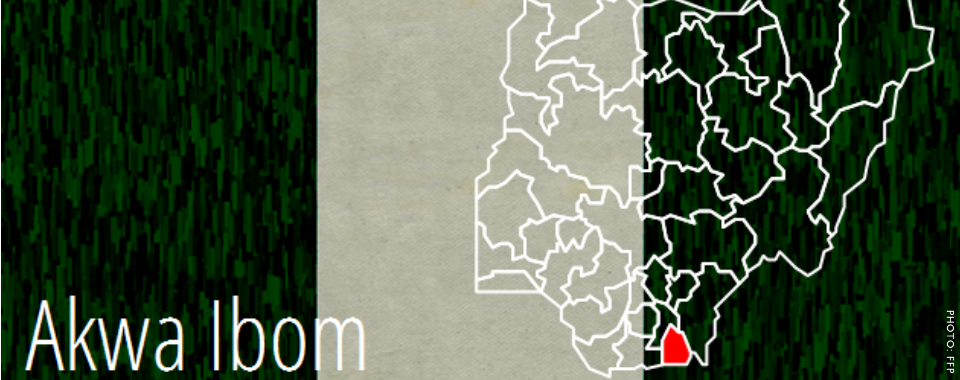BY PEACE AND SECURITY WORKING GROUP
Disclaimer: The following analysis is based on discussions with State-level actors and so reflects their perceptions, not the view of the Peace and Security Working Group. These scenarios were produced prior to the 2014 primary elections and are thus subject to change. Where relevant, updates have been made to reflect evolving dynamics.
Akwa Ibom At-a-Glance |
|
| Current Governor Godswill Obot AkpabioCurrent Ruling Party Peoples Democratic Party (PDP) Key February 2015 Elections Prognosis |
 |
| CLEEN Map of Hot Spots for Election Violence | |
 |
 |
| Peace Map (www.p4p-nigerdelta.org) | Violence Heat Map Jan 2009-Dec 2014 |
Elections in 2011
- Godswill Akpabio (PDP) won the gubernatorial election with 83.38% of the vote, followed by John James Akpanudoedehe (ACN) with 14.23% of the vote, and Lawrence Esin (CPC) with 1.36%.
- There was significant pre-election violence between the ACN and PDP, with purported assassination attempts against political aspirants and the killing of Akaninyene Ukpanah, a major PDP politician.
- There were several incidents of targeted as well as general violence surrounding the election. For example, early in March a student rally following a government speech regarding empowering students for the elections resulted in a stampede which reportedly left several dead. It was also reported that a popular journalist had been killed for voicing anti-government sentiments while an ACN chieftain was reportedly murdered by assassins although no specific motive was reported.
- Following the elections, the ACN challenged the election of Governor Godswill Obot Akpabio, claiming vote rigging and fraud. Following those allegations, it was reported that an INEC member went into hiding following death threats amidst claims that he had played a role in ballot rigging.
- Specifically in Uyo and Ikot-Ekpene there was a significant amount of violent incidents, mainly between PDP and ACN supporters, including political thuggery and targeted killings.
- Ethnic Tension in 2011: tension between the three main ethnic groups; the Ibibio, Annang and Oron, was heightened during the 2011 elections, mostly along party lines.
- Response: Police responded adequately to most violent incidents.
- Intra-party tension: PDP Governor Obong Godswill Akpabio fired his Secretary to the State Government (Obong Umanah Okon Umanah) due to political differences. Now Umanah wants to run for governor and Akapbio is running for the state senate because he’s reached the end of his term limit as governor.
- Controversy on which senatorial district the governorship will be zoned to, whether Eket or Uyo.
| Name | Position | Elected/ Appointed |
Party | Additional Information |
| Godswill Akpabio | State Governor | 2011 | PDP | (1) |
| Lady Valerie Ebe | Deputy Governor | 2012 | PDP | – |
| Aloysius Akpan Etok | Senator | 2011 | PDP | – |
| Ita Solomon James Enang | Senator | 2011 | PDP | – |
| Helen Udoakaha Esuene | Senator | 2011 | PDP | – |
Additional Information:
(1) Akpabio is not running for governor in 2015
Other political players include:
- Obong Umanah Okon Umanah, former SSG
- Obong Bassey Albert Akpan, former commissioner of finance
- Obong Victor Attah, former governor
- Senator John James Udoedehe, ACN leaderElections in 2015
Elections in 2015
Conflict Drivers:
- If the governorship is zoned to Eket senatorial district, then Uyo senatorial district will protest.
Update: Emmanuel Udom, considered a favorite of current governor Akpabio, was selected in the governorship primary. He is from Eket. - Imposing of the governorship candidate by current governor, lack of democratic process.
Update: Emmanuel Udom, considered a favorite of current governor Akpabio, was selected in the governorship primary. It was reported that all other candidates boycotted the delegate’s poll to choose the PDP candidate, citing irregularities and a lack of transparency. - If the elections are manipulated by PDP, then ACN may protest.
- Heightened ethnic tensions along party lines.
- Manipulation of ethnic or religious tensions along party lines.
- High rates of youth unemployment increasing the potential for their use in political violence and intimidation by various actors.
LGAs at risk of possible election violence
Eket,Esit Eket, Oron, Ini, Uyo, Mkapt Eni, Ikot Abasi, Nsit Ubium, Ibiono, Itu, Uruan.
Possible Types of Violence
Hijacking of ballot boxes, political thuggery, assassinations, violent rallies, kidnapping and abductions.
Possible Election Scenario
Much remains contingent on the results of the governorship zoning, which may result in high levels of violence. In addition, the perceived imposition of a candidate for governor by the current governor could also result in violence. Finally, there is always the risk of party rhetoric exacerbating ethnic and religious tensions in the state.
Before Elections
There could be a resurgence of 2011 violence, depending on which PDP candidate emerges and how democratic the process is perceived to be.
During Elections
There could be assassinations and hijacking of materials. The process could exacerbate ethnic tension and restiveness.
After Elections
There might be conflict not only between various political parties but also within the ruling party PDP.
Download the full report in PDF format
.
These reports are a collaborative effort of The Fund for Peace and other members of the Nigeria Peace and Security Working Group (PSWG) in Nigeria. These reports reflect the result of a participatory process with national and local-level stakeholders on potential risk factors and scenarios for the February 2015 Nigeria general elections.
For more information, please contact:
Nate Haken at The Fund for Peace, [email protected].
